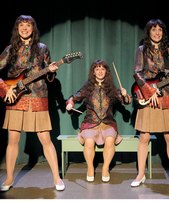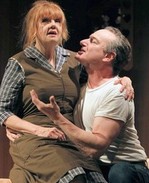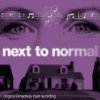SITE GUIDE
SEARCH
REVIEWS
REVIEW ARCHIVES
ADVERTISING AT CURTAINUP
FEATURES
NEWS
Etcetera and
Short Term Listings
LISTINGS
Broadway
Off-Broadway
NYC Restaurants
BOOKS and CDs
OTHER PLACES
Berkshires
London
California
New Jersey
DC
Philadelphia
Elsewhere
QUOTES
TKTS
PLAYWRIGHTS' ALBUMS
LETTERS TO EDITOR
FILM
LINKS
MISCELLANEOUS
Free Updates
Masthead
A CurtainUp Review
The Shaggs: Philosophy of the World
By Elyse Sommer
|
Don't say nothing bad about my dad If you do, you'r only putting me down, too I know what people say: If they were me They'd run away. But he's the only dad I ever had. — Dot, the Shaggs lead singer, in one of the musical's most poignant songs, "Don't Say Nothing Bad About My Dad." |

l-r: Emily Walton, Sarah Sokolovic and Jamey Hood
(Photo: Joan Marcus) |
So what made the girls' uneducated, unmusical, impoverished textile worker dad think that he could turn his talent and glamour challenged daughters into a hit sisters act? While the girls had shown no signs of either musicality or showmanship, they did, like all '60s teenagers, like to listen to the big musical stars. And so, when Austin saw them ecstatically bobbing up and down with the Beatles on The Ed Sullivan Show, he suddenly remembered his fortune telling mother's prediction that he would have daughters who would bring him "to the light." Her vision of his marrying a strawberry blonde woman had already come true. When his desperation to get out of the poverty was intensified by missing out on a promotion, it didn't take much for the memory of his mom's vision to make Austin suddenly see his daughters transformed from enthusiastic viewers to successful performers.
No sooner thought than done, Dad Wiggin buys a drum set and a pair of electric guitars and launches into the determined effort to make his dead mom's prediction come true. He obsessively pursued this delusional dream, persuading his wife to dig intosavings from money earned as a seamstress and borrowing on his mortgage for music lessons and an album entitled The Shaggs: Philosophy of the World.
The reception the band got when they performed at the town hall of their small New Hampshire town, the way they let him browbeat them into endlessly playing a song over and over again and their inability to improve on the atonal awfulness might have made even Gypsy's Mama Rose cry "stop" But not Austin. Blinded and tone deaf by desperation and ambition, he heard what he wanted to hear.
For the creative team that turned the story of The Shaggs (Austin's name for the Wiggin sisters' band) into a musical, the journey to a major New York theater has also required stick-to-itiveness that borders on the obsessive. That journey which began with a Los Angeles production in 2003 has now brougt The Shaggs: Philosophy of the World, which is also the the title of the only Shaggs album, to Playwrights Horizon's main stage as a co-production of that company and New York Theater Workshop.
It's probably the most offbeat and unique musicals to be seen anywhere in Manhattan. While The Shaggs were a real band and the story is true (with the usual liberties taken with any fact-based theater piece), this is not a jukebox musical. Fitting it into that genre is an impossibility, given the limited output of the Shaggs, not to mention that their lack of musicality makes for uneasy listening for anyone not belonging to the cultish fan base that gave them belated accolades for the unadorned honesty of their singing and playing. Thus the songs you hear are composed by Gunnar Madsen and the lyrics by Madsen and and book writer Joy Gregory. Snippets from the are interspersed into these songs so that the overall sound and tone of the lyrics echo the work of the Shaggs.
Except for one of the show's best scenes, when Austin brings the girls are in a recording studio and we are privvy to both Austin's fantasy listening experience and the engineers' appalled reaction to what we're hearing, the on stage Wiggin sisters singing takes the form of internal and thus melodic pop-rock monologues.

Annie Golden and Peter Friedman
(Photo: Joan Marcus) |
Having Austin start things establishes this as very much his story and gives the piece the universality of a common man's turning deaf and blind in his pursuit of the American Dream.
Peter Friedman is both scarily fierce and pathetic as the driven paterfamilias but under John Langs' direction he's never demonized or ridiculous. Though there's little doubt that his treatment of his daughters borders on abuse, the show makes no allusion to anything physical (though the Orleans article does in fact quote one of the sisters as admitting to inappropriate intimacy). The fact that t Friedman is a better actor than singer actually works well for this role. Annie Golden gives a warm and persuasive portrait of the put upon but ever loyal wife and makes a strong contribution vocally.
Jamey Hood, who's been with the show through all its permutations, and newcomers Sarah Sokolovic, and Emily Walton manage to depict adolescent innocence as well as the complicated love-hate feelings that make them collaborate with their father's unrealistic demands. Hood as Dot, the eldest and most loyal daughter sums it all up in one of the show's best songs, "Don't Say Nothing Bad About My Dad." Sokolovic is the spirited Betty and Walton's mute by choice Helen is the most fully developed member of the trio, the only one who ultimately stands up to the father.
Cory Michael Smith's Kyle is just right as Helen's slacker boyfriend who brings in something of the outside world as a Vietnam draftee. Steve Routman and Kevin Cahoon ably round out the cast as multiple characters. The most distinguishing aspect of the sisters' performance is the way they manage to sound like the Shaggs at their most unmusical at the same time they let us hear what their deluded father is hearing.
There's no happy ending or ephany in this story. Austin's dream did sort of come true when notable rock musicians and writers began to see something wonderful in those inharmonious Shaggs songs, but too late for him. In the final analysis, I think it would have worked better within the genre of a play with music which would allow more detailed character development and a less abrupt ending. Still the Madsen/Gregory songs capture the mood and melodic beat of some of the best rock bands of the show's era, and the clever blend of the girls pleasing harmonies with â la Shagg undertones makes for a very different and absorbing musical experience.
The Shaggs: Philosophy of the World, may like an album end up as a cult hit at adventurous regional theaters rather than another Jersey Boys. With that in mind, see it while you can.
Postscript: The musical culled the family down to just the three girls for simplicity's sake. There were actually seven, two of them boys. Austin Wiggin was just 47 when he died in 1975 at which point his daughters put down their instruments and seldom played again. Helen, the drummer, died in 2006, but Dot and Betty still live in New Hampshire and there's been talk of a movie about their life. The Susan Orleans New Yorker article is available on line-- http://www.susanorlean.com/articles/meet_shaggs.html .
|
The Shaggs: Philosophy of the World A Musical Play In Two Acts, based on the true story of The Shaggs Book by Joy Gregory; music by Gunnar Madsen; lyrics by Ms. Gregory and Mr. Madsen; story by Ms. Gregory, Mr. Madsen and John Langs Directed by John Langs Choreography: Ken Roht Cast: Steve Routman (Mr Wilson/Exeter Talent Show Host/ Russ/Hank), Peter Friedman (Austin Wiggin), Kevin Cahoon (Charley/Bobby), Annie Golden (Annie Wiggin),Emily Walton (Helen Wiggin ), Jamey Hood (Dot Wiggin), Cory Michael Smith (Kyle), Sarah Sokolovic (Betty Wiggin) Scenic Design: Mimi Lien Costumes: Emily Rebholtz Lighting Design: Geoff Korf Sound: Darren L. West Music Direction: Aaron Gundy Orchestrations and Vocal Arrangements: Gunnar Madsen Music Coordinator: John Miller Stage Manager: Lori Lundquist Running Time: 2 hours and 30 minutes, including intermission Playwrights Horizons, New York Theatre Workshop & South Ark Stage at Playwrights Horizons Mainstage Theater 416 West 42nd Street From 5/12/11; opening 6/07/11; closing 7/03/11 Tuesdays at 7PM, Wednesdays through Fridays at 8PM, Saturdays at 2:30 PM & 8PM and Sundays at 2:30 PM & 7:30 PM. Reviewed by Elyse Sommer at 6/04/11 press preview |
Highlight one of the responses below and click "copy" or"CTRL+C"
Paste the highlighted text into the subject line (CTRL+ V): Feel free to add detailed comments in the body of the email. . .also the names and emails of any friends to whom you'd like us to forward a copy of this review. Visit Curtainup's Blog Annex For a feed to reviews and features as they are posted add http://curtainupnewlinks.blogspot.com to your reader Curtainup at Facebook . . . Curtainup at Twitter Subscribe to our FREE email updates: E-mail: esommer@curtainup.comesommer@curtainup.com put SUBSCRIBE CURTAINUP EMAIL UPDATE in the subject line and your full name and email address in the body of the message. If you can spare a minute, tell us how you came to CurtainUp and from what part of the country. |
||||

Slings & Arrows-the complete set
You don't have to be a Shakespeare aficionado to love all 21 episodes of this hilarious and moving Canadian TV series about a fictional Shakespeare Company




